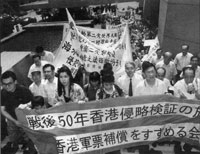
by Midori Hiraga
Published in Hongkong Standard, 20 September 1995
|
Stories by Midori Hiraga |
| How I became a Third World journalist |
|
English |
| On the 50th anniversary of Hiroshima |
|
Japanese use holiday to purge guilt over the past |
|
Chinese migrant's battle to obtain degree |
|
Filipino arts group shares message of hope and justice |
|
Japanese |
| Hong Kong's handover 1997 |
|
"We are not products" -- Foreign domestic helpers in Hong Kong |
|
Life as the only Japanese reporter on an English newspaper in Hong Kong |
|
Curriculum Vitae |
|
|
THEY spent HK$12,000 each for a summer holiday in Hong Kong recently but this was no ordinary break for a group of Japanese -- they wanted to learn about their country's war record in the territory.
There were more than a dozen of them on this tour aimed at "visiting the remains of Japanese army occupation in Hong Kong and understanding Japanese responsibility as the invader".
Japanese troops occupied Hong Kong from the "Black Christmas" of 1941 to 1945. In the three years and eight months, the colony's people were subjected to great suffering.
But this history is not well known to most of the Japanese public.
People tend to remember more what happened in their neighbourhood. What most Japanese people experienced during the war was the American B-29 bomber attacks on their cities and the deaths of their relatives.
"Living in Japan meant that our image of the war was one of Japanese suffering and hardship," one of the tour members said.
"It is difficult for the Japanese public to see themselves as invaders because that role was played outside the country."
The tour was organized by Yukio Wani, a Japanese history teacher.
The group first learnt the basic history of Hong Kong at the Museum of History in Tsim Sha Tsui. On the second day, they attended a demonstration staged by the Hong Kong Reparation Association and joined its 600 members in demanding a full apology and compensation for the Hong Kong war victims. They also attended the 50th commemoration ceremony of liberation.
 The Japanese visiters at a local demonstration seeking war compensation |
The tourists were accompanied by Hong Konger Ko Tim-keung, who is fluent in Japanese and an authority on Hong Kong history.
He has written several books on the Japanese occupation of Hong Kong.
"The Japanese public do not know what happened during the Japanese military occupation of Hong Kong," said Mr Wani. "There is no documented study of this period in Japanese."
Though many Japanese people now visit Hong Kong, their main concern is business, shopping, sightseeing. Not many are interested in the history of Japan's occupation.
Based on his belief that true human relations can only be established on a full mutual understanding of their common history, Mr Wani has been organizing similar tours for years.
"I believe both the Japanese and Hong Kong public must come to understand the history of the occupation period. This is the only way to establish true friendship between us," he said.
Mr Wani works actively to help Hong Kong war victims in their campaign for compensation. He also researches the occupation.
He was originally drawn to the subject by coincidence. In 1991, a friend asked him to help research the military currency forced upon Hong Kong people, who never received compensation for the subsequently worthless cash.
"To tell the truth, my first impression of the victims wasn't good. The first thing they did was to push the bills in front of me and ask for cash," he said. "All they wanted was the money."
Mr Wani met several Hong Kong war victims in Japan. The older victims were unfriendly.
But when he visited Hong Kong and listened to the victims' stories, he found there were more serious problems than the military currency.
"The malevolent occupation by the Japanese army was a more serious problem than the problem of military bills," he said.
Because of the cruel treatment they suffered, Hong Kong people had a complicated view of today's Japanese people.
"Hong Kong people admire the Japanese for some reasons and hate them for others," Mr Wani said. "They enjoy Japanese movies, Japanese comics and electronic products but they hate Japan because of war memories.
"These complicated views can be straightened only by fully understanding history."
Though sometimes war victims' sole concern may be compensation, Mr Wani thinks that it is a natural reaction but there is more to be asked for.
He said they need help to persuade the Japanese government to agree to their demands.
"The payment for military currency is only a part of a huge problem which the Japanese occupation gave Hong Kong society," he said. "The Japanese failed to recognize the problems left behind."
He said the Japanese had done nothing to record history and recognize it.
"Oral stories from the victims are not enough. We need to gather the written documents and must have a comprehensive analysis of the Japanese occupation of Hong Kong.
"Written documents and research are urgently needed in order to help the war victims. It is difficult for a group of old citizens to fight against a government without these documents.
"And research is essential for the Japanese to understand the impact their occupation had on Hong Kong society.~
Some of the tour members were photographers. One of them said he took plenty of pictures of the military currency -- pictures that will help convey the problem to the Japanese public.
Others were teachers. They were keen to learn the facts so that they could convey them to their students.
"Some of the Japanese politicians are backed by families of war veterans and that does not help the Asian war victims' battle for compensation," a secondary teacher said.
"We cannot rely on the politicians. Each citizen has to take action."